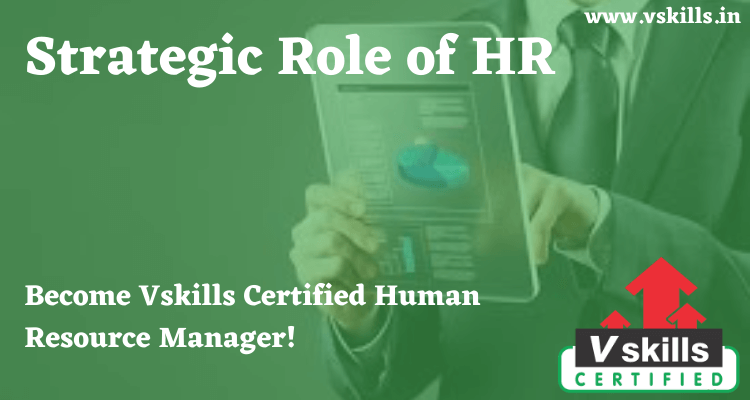The strategic role of HR (human resources) is crucial in ensuring the success of an organization. HR plays a key role in attracting, developing, and retaining talent, which is critical for the long-term success of the organization.
Strategic Role of HR and its Implementation
Here are some ways in which HR can play a strategic role:
- Aligning HR strategy with organizational strategy: HR should align its strategy with the overall organizational strategy. This involves understanding the business objectives, identifying the skills and talent needed to achieve those objectives, and developing HR strategies to attract, develop, and retain the right talent.
- Talent management: HR should focus on talent management, which involves identifying, developing, and retaining top talent. This includes developing programs for leadership development, succession planning, and career development.
- Workforce planning: HR should engage in workforce planning, which involves forecasting future talent needs and ensuring the organization has the right people with the right skills in the right roles at the right time.
- Employee engagement: HR should focus on employee engagement, which involves creating a positive work environment, providing opportunities for professional growth and development, and promoting a culture of transparency and open communication.
- Performance management: HR should develop and implement effective performance management systems that help align individual performance with organizational objectives and goals.
- Diversity and inclusion: HR should focus on promoting diversity and inclusion in the workplace. This includes developing programs to attract and retain a diverse workforce and promoting a culture of inclusion.
Overall, HR has a critical role to play in the success of an organization. By aligning its strategies with the organizational objectives, focusing on talent management, engaging employees, and promoting diversity and inclusion, HR can help drive organizational success.
In every organization, motivation, and incentives should be attached with a goal to work on. A needs assessment and HR development strategies should be deployed focused on accomplishing the organization’s mission. Such needs assessment and HR development and their effective planning lead to improved productivity. It is then implemented by using macro tools, such as Management by Objectives at the individual level, and Total Quality Management at the group level.
The human resource which used to be a record-keeping department of employees of an organization has evolved into an important strategic asset for an organization in an ever-competitive world.
Factors emphasizing the strategic role of HRM
- Newer technological changes
- Increasing globalization
- Changing manpower demographics
- Increased profitability focus
Due to these factors, HRM provides sustained competitive advantage to the organization by making provision of productive manpower and enabling a nourishing environment to nourish, encourage, and grow it. Noticeable financial returns have been observed in organizations where HRM systems have excelled operationally and synchronized with business goals.
Strategic Human Resource Management (SHRM) is based on a strategy-focused, decision-focused, content-focused, and implementation-focused approach. Out of these approaches, the implementation-focused approach has gained share. Aligning HRM systems to the business strategy can be considered as a one-way vertical fit.
The real benefits of strategic planning can only be well utilized if individuals learn how to implement it and know its value. In a cosmopolitan, knowledge-based organization, strategic planning is basically referred to as strategic human resource planning. The empirical research studies revealed that strategic human resource management affects organizational performance. Some of the common HR practices include formal training systems, career structure, result-oriented performance evaluation, employee participation, employment security, detailed job profiles, and reward-based compensation, which form the basis of the theory of strategic human resource management and contribute significantly to organizational success.
Practice Question
Q1. What is the strategic role of HR?
A) To ensure compliance with legal regulations
B) To attract, develop, and retain talent
C) To manage payroll and benefits
D) To provide training and development opportunities
Correct Answer: B) To attract, develop, and retain talent
Q2. How can HR align its strategy with organizational strategy?
A) By developing a compliance program
B) By identifying business objectives and talent needs
C) By outsourcing HR functions
D) By providing employee benefits
Correct Answer: B) By identifying business objectives and talent needs
Q3. What is talent management?
A) The process of managing employee benefits
B) The process of managing employee performance
C) The process of identifying, developing, and retaining top talent
D) The process of managing employee payroll
Correct Answer: C) The process of identifying, developing, and retaining top talent
Q4. What is workforce planning?
A) The process of identifying future talent needs
B) The process of managing employee performance
C) The process of managing employee benefits
D) The process of managing employee payroll
Correct Answer: A) The process of identifying future talent needs
Q5. What is employee engagement?
A) The process of managing employee payroll
B) The process of managing employee benefits
C) The process of creating a positive work environment and promoting professional growth and development
D) The process of managing employee performance
Correct Answer: C) The process of creating a positive work environment and promoting professional growth and development



